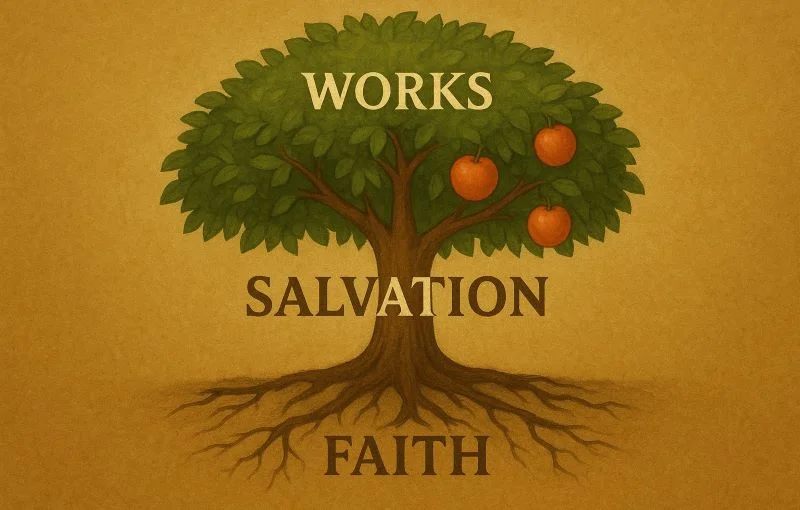A biblical look at justification by faith alone and how works fit into the Christian life.

Not long ago, I had a heartfelt discussion with someone about one of the biggest questions in Christianity: Is salvation by faith alone, or by faith plus works?
He was convinced that our good works play a huge role in securing salvation; that it’s faith plus works that gets us to heaven. I shared my perspective, which is a little different: I believe that salvation comes by faith alone, and that true salvation naturally leads to a life filled with good works.
In other words:
Faith → Salvation → Works
That conversation really stuck with me because it highlighted just how much confusion surrounds this topic. For centuries, Christians have wrestled with questions like: Does God accept us by faith alone? What place do our good deeds have in the Christian life? And do Paul and James contradict each other when they talk about justification?
These aren’t just abstract theological debates; they affect how we live out our faith day by day. If we misunderstand this, we risk either trying to earn God’s favor through endless striving or swinging to the other extreme and treating obedience like it doesn’t matter at all.
That’s why in this post, we’ll look closely at what the Bible actually teaches about justification by faith, the role of works, and how Paul and James complement each other rather than contradict.
What Does the Bible Mean by Justification by Faith Alone?

Salvation isn’t something we can earn; it’s God’s free gift through faith in Jesus Christ. Paul makes this clear in his letters: being made right with God comes by trusting His grace, not by keeping rules or piling up good deeds.
When people talk about justification by faith, they often turn to Paul’s writings. Key passages like Romans 3:28 remind us that a person is justified by faith apart from the works of the law. But faith, in Paul’s teaching, isn’t just agreeing with a set of ideas; it’s total trust in God’s unearned grace.
Paul was addressing people who thought strict obedience to Jewish law was enough to win God’s favor. He stressed that grace has no conditions: anyone can receive it, no fancy rituals required.
The early church wrestled with these ideas as Jews and Gentiles learned to follow Christ together, and those discussions shaped Christian theology for centuries. Even today, revisiting these foundations clears up common misconceptions. Salvation rests not on our behavior but on God’s immense love and grace, and living in that truth transforms how believers walk with Him daily.
Does James Teach Justification by Works?
At first glance, James seems to say the opposite of Paul. But really, he’s showing us that real faith is never invisible. Faith without works is dead, meaning genuine belief will always express itself in love, obedience, and action.
In James 2:14–26, he presses this point with sharp clarity: claiming faith without evidence is useless, like a screen door on a submarine. Abraham and Rahab’s examples prove that faith shows itself through action, not just words.
James isn’t downplaying faith but insisting that authentic faith is active, outward, and noticeable. His message pushes believers to let their trust in God shape real-life choices that bless others and confirm the reality of their faith.
Do Paul and James Disagree on Faith and Works?
On the surface, Paul and James might look like they disagree, but they were addressing different problems. Paul was correcting people who thought salvation could be earned through the law. James was correcting people who claimed faith but showed no evidence of it.
Seen together, their teachings complement each other beautifully: Paul explains the root of salvation: faith in Christ alone. James describes the fruit: good works that naturally grow out of that faith. Far from contradicting, they harmonize as two sides of the same truth: salvation by grace through faith always results in a transformed life.
The Role of Works in Final Judgment
The Bible teaches that while we are justified by faith, our works will be examined as evidence of that faith. Judgment isn’t about tallying deeds but revealing whether our trust in God was genuine and transformative.
This perspective brings both comfort and challenge. Comfort, because salvation rests on grace alone. Challenge, because genuine faith should consistently bear fruit in our actions. In this way, works become the visible outworking of an inward reality: a testimony to the grace we’ve received.
What Genuine Faith Looks Like in Everyday Life

True faith changes the way we live. It shows up in compassion, service, kindness, and obedience; not as boxes to tick, but as the natural outflow of a heart transformed by God’s grace.
Living out genuine faith is where belief turns into real-world impact. It’s about showing what you believe through how you behave. Ask yourself: What does your faith push you to do? If it isn’t spurring you to love, help, and serve, it may be time to reevaluate.
A living faith bears fruit: qualities like compassion, kindness, and patience that bless both individuals and communities. It’s not just inward conviction but an outward witness that others can see, even without you saying a word.
Self-examination plays a key role here. Taking stock of where your faith is leading, and adjusting so your steps align with God’s Word, ensures that what you believe doesn’t stay in your head but flows into daily actions. Knowing where you’re thriving and where you’re struggling can guide personal growth and deeper engagement with faith.
The encouragement is to keep moving forward, rooted in grace while actively walking in love, service, and obedience. This balance reflects the vibrant relationship between belief and practice.
Conclusion: Faith That Works
That conversation I had about faith and works keeps coming back to me, because it reminds me how easy it is to mix up the order of things. The Bible makes it clear: we are justified by faith alone, not by anything we could ever do to earn God’s approval. But genuine faith never stays alone; it always produces fruit.
That’s why I like to think of it this way:
Faith → Salvation → Works
Faith is the root. Salvation is the gift. Works are the fruit. Get the order wrong, and you end up with either crushing legalism or empty lip-service faith. Get it right, and you see the beauty of God’s grace lived out in daily obedience and love.
So here’s the challenge: take a moment to reflect on your own walk with Christ. Is your faith alive and visible through the way you live, love, and serve? Don’t fall into the trap of trying to earn salvation, but also don’t settle for a faith that never shows itself in action.
👉 Call to Action: If this topic has stirred something in your heart, I encourage you to open your Bible this week to Romans 3 and James 2. Pray over these passages, asking the Lord to deepen your faith and make it bear fruit.
And if you’d like more encouragement, consider joining our community so we can keep growing together in living out a faith that truly works.

Excellent.
Thanks, Ben.
I appreciate you taking the time to read the article.
God bless you. 🙏